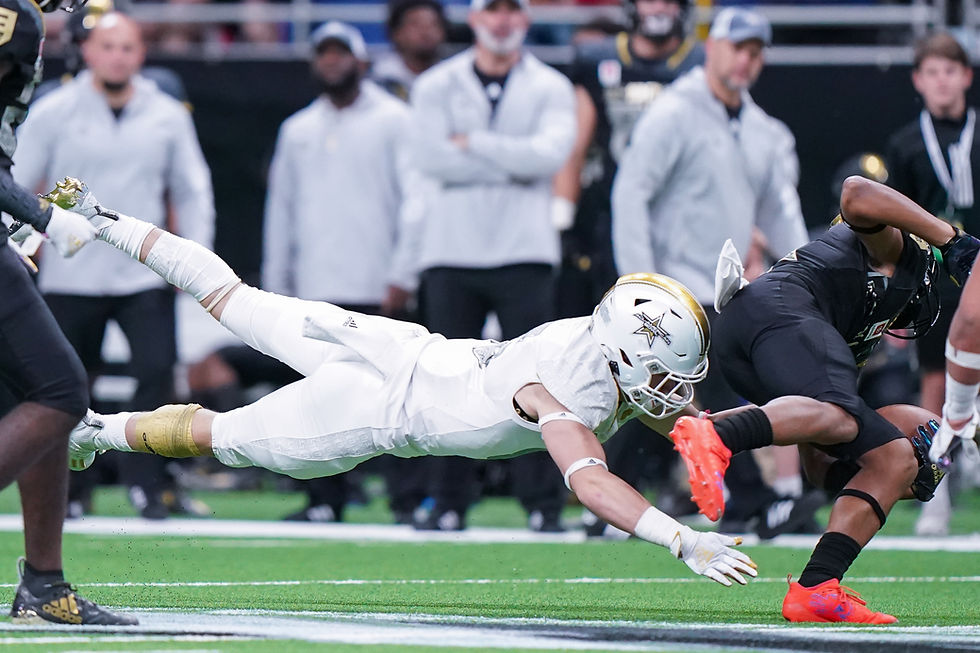Leadership Lessons from High School Football: Building Skills That Last a Lifetime
- Ayden Hector
- Jun 2
- 4 min read
High school football is often viewed simply as a sport, but it serves as a powerful platform where young athletes learn critical leadership skills. The intensity of competition, the need for teamwork, and the daily commitment required create an environment that fosters growth far beyond physical abilities. Through football, players develop traits such as responsibility, communication, confidence, and resilience, all of which contribute to strong leadership. This article explores in depth how high school football shapes leadership skills that players carry into their futures.
Teamwork as the Foundation of Leadership
Football is the ultimate team sport, where no single player can succeed without the support and effort of the entire team. From offense to defense, every player has a unique role that must work in harmony with others. This reliance on collaboration teaches players early on that leadership is about bringing people together toward a shared goal.
More importantly, football emphasizes clear and constant communication. Coaches and players exchange instructions and feedback, while players themselves must coordinate with one another in real-time. These experiences sharpen communication skills essential to leadership — knowing when to speak up, when to listen, and how to motivate others through words and actions.
Taking Responsibility and Leading by Example
One of the most straightforward ways football builds leadership is through the responsibility placed on players, especially team captains. These leaders must hold themselves accountable for their actions and performance, recognizing that their behavior sets the tone for the team. When they show commitment, discipline, and positivity, it inspires others to follow.
Taking responsibility also means accepting mistakes without deflecting blame. Football players learn to review their performance, identify areas to improve, and take corrective action. This accountability breeds maturity and integrity, qualities that define effective leadership in any arena.
Discipline and Work Ethic: Pillars of Leadership
Success in football depends heavily on discipline. From early morning practices to late evening drills, players must consistently put in effort, often sacrificing personal time and comforts. This relentless dedication cultivates a strong work ethic that becomes part of a leader’s mindset.
Such discipline also helps players develop excellent time management skills. Balancing schoolwork, training, and social life requires planning and prioritization. Leaders who master these skills not only perform better on the field but also prepare for future demands in college, careers, and personal life.
Confidence Gained Through Experience
Football naturally builds confidence by pushing players outside their comfort zones. Whether stepping onto the field for the first time or leading a crucial play, athletes gain trust in their abilities through action and achievement.
This confidence translates into leadership. Players who believe in themselves can motivate teammates and make decisions under pressure. The game also encourages players to take initiative, stand up for their team, and lead by example — all behaviors that strengthen leadership skills.
Handling Pressure and Embracing Adaptability
The fast-paced and unpredictable nature of football creates high-pressure situations on a regular basis. Players must remain calm, focused, and decisive when the stakes are highest. This experience trains them to manage stress effectively, a critical skill for any leader.
Adaptability is equally essential. Coaches often adjust their strategies during games to respond to their opponent’s moves. Players learn to adapt quickly and embrace new roles as needed. This flexibility fosters problem-solving abilities and mental agility, traits that help leaders navigate uncertainty and change with confidence.
Motivating Others and Building Team Spirit
Leadership on the football field goes beyond individual skills; it involves inspiring and uplifting others. Players who encourage their teammates during tough times create a positive and motivating environment. This support helps build trust and loyalty within the team.
Understanding how to motivate others is a vital leadership skill that football nurtures. Players learn that genuine encouragement and empathy foster stronger bonds and improved performance. These lessons in emotional intelligence help athletes become compassionate leaders who understand the needs of those they guide.
Learning From Successes and Setbacks
Football seasons are filled with victories and defeats, and both offer valuable lessons in leadership. Winning builds a sense of accomplishment and teaches players the rewards of teamwork and preparation. It also provides opportunities to practice humility and grace in the face of success.
Losses, while challenging, encourage reflection and resilience. Players learn to handle disappointment constructively, identifying what went wrong and how to improve upon it. This ability to learn from setbacks fosters perseverance and emotional strength — crucial components of leadership that enable individuals to keep moving forward despite obstacles.
Leadership Beyond the Field
The leadership skills developed through high school football often extend into many areas of life. Former players frequently report that the discipline, teamwork, and confidence gained on the field help them excel in academics, social settings, and future careers.
Moreover, the friendships and mentorships formed during football seasons contribute to a support network that encourages continued growth. The lessons learned about leading by example, motivating others, and handling adversity become valuable assets that players carry long after their playing days end.
Final Reflections
High school football is much more than a sport; it’s a robust environment for developing leadership skills. Through the demands of the game, players cultivate teamwork, responsibility, discipline, confidence, and resilience. These qualities not only shape them into better athletes but also prepare them to become firm, effective leaders in their communities and beyond. The field serves as a proving ground where young individuals learn how to inspire, guide, and persevere — lessons that last a lifetime.


Comments